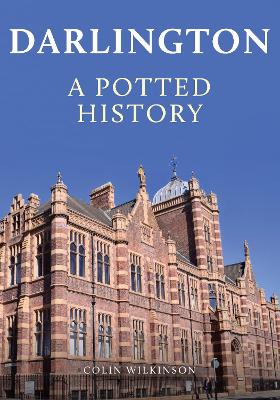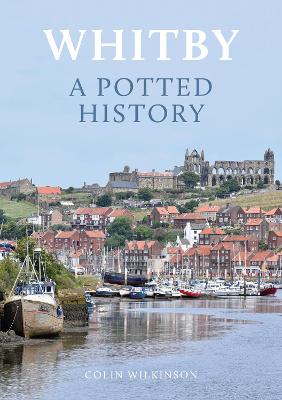A Potted History
2 total works
Darlington’s history is popularly seen as the story of Quakers and railways but there is much more to the town’s past than this. From its beginnings as a Saxon settlement, it became the southern stronghold of the land of the Prince Bishops, a market town, had its own Great Fire long before London, provided inns for travellers along the Great North Road, became an industrial centre and faced the twenty-first century with a diversified economy as the old heavy industries closed. Along the way, as the town grew rapidly in the nineteenth century, it was a group of Quaker Darlington businessmen who masterminded the beginnings of Britain’s railway system in the town.
This book will look back over the centuries to uncover the fascinating history of the town. Stories of the town’s rebels, reformers, activists, benefactors, heroes and campaigners, England’s first black professional football player, as well as the lives of the ordinary folk, bring the history to life, together with illustrations to show where reminders of the town’s past can still be found.
Illustrated throughout, this accessible historical portrait of the transformation that Darlington has undergone through the ages will be of great interest to residents, visitors and all those with links to the town.
This book will look back over the centuries to uncover the fascinating history of the town. Stories of the town’s rebels, reformers, activists, benefactors, heroes and campaigners, England’s first black professional football player, as well as the lives of the ordinary folk, bring the history to life, together with illustrations to show where reminders of the town’s past can still be found.
Illustrated throughout, this accessible historical portrait of the transformation that Darlington has undergone through the ages will be of great interest to residents, visitors and all those with links to the town.
Whitby has a fascinating history, changing roles over the centuries from a religious centre to one of the country’s most important ports and later a resort. The king of Northumbria founded the monastery on the headland in the seventh century and installed St Hilda as the first abbess. Although it was abandoned following attacks by Danish raiders who later settled in the area, the abbey was re-established by the Normans. Following Henry VIII’s Dissolution of the Monasteries, the harbour and new industries were developed in Whitby, including alum mining, shipbuilding and transporting coal. Captain James Cook’s ships Endeavour and Resolution were originally Whitby colliers. Shipowners, merchants and shipbuilders settled in Whitby and built grand houses, alongside the more humble dwellings of those who worked in the port or local industries.
The town was also known for its whaling fleet and the production of jet jewellery. From the eighteenth century the town began to be developed as a resort, with more visitors arriving in the nineteenth century when the railway was built, and today is a popular tourist destination. Through successive centuries the author looks at what has shaped Whitby’s history. Illustrated throughout, this accessible historical portrait of the transformation that Whitby has undergone through the ages will be of great interest to residents, visitors and all those with links to the town.
The town was also known for its whaling fleet and the production of jet jewellery. From the eighteenth century the town began to be developed as a resort, with more visitors arriving in the nineteenth century when the railway was built, and today is a popular tourist destination. Through successive centuries the author looks at what has shaped Whitby’s history. Illustrated throughout, this accessible historical portrait of the transformation that Whitby has undergone through the ages will be of great interest to residents, visitors and all those with links to the town.

